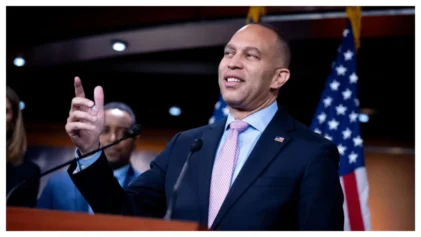
President Donald Trump has proposed a number of policies that would hurt low-income Americans, who are predominately Black.
(Photo by Theo Stroomer/Getty Images)
Before Donald Trump became president, he asked African-Americans on the campaign trail: “What do you have to lose?” Behind the question was a declaration that he would in particular help those struggling in inner cities.
But after the May 23 release of his administration’s 2018 budget, titled “A New Foundation for American Greatness,” some are questioning whether the deep cuts to programs for the poor, health services, educational aid and other federal funding could instead do greater harm to Black America.
The budget proposal, which Congress will decide whether to approve in one form or another, calls for a total of $3.6 trillion in spending reductions and reforms over the next decade.
While increasing defense spending by 10 percent and making no changes to Social Security’s retirement program or Medicare — two of the government’s costliest programs — Trump has proposed cutting $800 billion from Medicaid, $272 billion from welfare programs and $192 billion from food-assistance programs.
In March, when the new president dropped his “skinny budget,” highlights of his fiscal agenda, even some Republicans lawmakers balked at the drastic spending cuts to programs many Americans have come to rely on. Some policy analysts argue that African-Americans are overrepresented as participants in programs and services that stand to be dramatically cut or eliminated in Trump’s budget, and therefore have much to lose.
Margaret Simms, director of the Urban Institute’s Low-Income Working Families Initiative, and her colleague Kilolo Kijakazi, said the cuts on the surface appear to be race neutral. “But due to the circumstances in which many people of color find themselves because of structural racism, these budgetary shifts will disproportionately affect communities of color,” they argue.
Despite an Oval Office photo-op earlier this year with presidents of many of the nation’s historically Black colleges and universities, proposed cuts to higher education, including Federal Supplemental Educational Opportunity Grants, would deeply affect many Black students’ ability to pay for school, according to some budget analysts.
Among programs on the chopping block are the Minority Business Development Agency, which assists minority-owned businesses, the Home Energy Assistance Program that helps the elderly and low-income residents pay their heating and power bills, the Community Development Block Grant Program, which subsidizes Meals on Wheels and other anti-poverty programs, and the Legal Services Corp, established by Congress to provide civil legal aid for low-income Americans.
In response, the National Urban League urged the White House to remember that millions of Americans are still struggling to recover from the last recession.
“Siphoning money from entitlement programs in order to grow defense and increase tax cuts for the wealthy would hit rural, urban and low-income Americans the hardest and likely throw the U.S. economy back into another recession,” Marc Morial, president and chief executive, said in a statement.
Not everyone agrees the changes will adversely impact African-Americans.
Writing for the conservative website The Federalist in April, Omari Faulkner, a former State Department cultural envoy, labeled assertions like the editorial written by Democratic U.S. Rep. Steve Cohen of Tennessee in The Commercial Appeal titled “Trump budget hurts African-Americans” as “grandstanding.”
“High homicide rates, underperforming schools and high poverty rates are the real issues plaguing my hometown of Memphis and creating roadblocks, not President Trump’s 2018 federal budget,” Faulkner wrote.
But Wesley Tharpe, research director at the Georgia Budget & Policy Institute, an Atlanta-based state budget watchdog, said the drastic changes would not only hurt working and low-income families, but the middle class, too, as federal funds account for about 31 cents of every dollar in state budgets nationwide.
“If the federal government covers fewer health care costs for vulnerable workers and poor children, state taxpayers have to pick up the remainder of the bill,” he said in an email. “If Congress sends fewer dollars down to local K-12 schools, then communities could face higher property taxes.”
The Congressional Black Caucus urged the president to protect the country’s social safety net programs. It even released an alternative budget in March.
“This budget is immoral and irresponsible and confirms what then-candidate Trump showed us time and time again — he only cares about people who have bank accounts that look like his,” CBC chairman U.S. Rep. Cedric Richmond, (D-La.), said in a statement.


